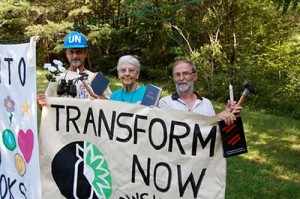
The three anti-nuclear weapons activists pictured above allegedly cut through fences and vandalized a high-security building at the Y-12 National Security Complex in July and now face federal charges of property destruction, property depredation, and injuring national defense premises. From left to right the three are Michael R. Walli, Megan Rice, and Greg Boertje-Obed. (Submitted photo)
In one of a series of motions last week, the three protesters who broke into the Y-12 National Security Complex on July 28 asked a federal court to dismiss the new sabotage charges filed against them in December.
Attorneys for the protesters—anti-nuclear weapons activists Greg Boertje-Obed, Megan Rice, and Michael R. Walli—said the new charges, which could add up to 20 years in prison, are unconstitutional, vindictive, and selective. They said the new charges were brought because the defendants earlier refused to plead guilty to less serious crimes.
In addition, the sabotage charges are rarely applied to civilian conduct and should not have been used in this case because Y-12 is a private contractor site and not a military base, the four attorneys for the protesters said in a motion to dismiss filed in U.S. District Court in Knoxville on Friday.
Boertje-Obed, Rice, and Walli are accused of sneaking into Y-12 before dawn on July 28, cutting through fences in the high-security Protected Area, and splashing human blood and spray-painting slogans on the Highly Enriched Uranium Materials Facility, where the nation’s primary supply of bomb-grade uranium is stored.
In August, the trio was charged with property depredation, trespassing, and attempting to injure federal property. Those charges carried possible prison sentences of up to 16 years in prison.
The new charges, which do not include the previous trespassing charges, carry total prison sentences of up to 35 years.
The defendants’ attorneys said federal prosecutors tried to persuade the defendants to plead guilty to two of the three charges filed in August and threatened to bring the more serious sabotage charges. The defendants’ attorneys are William P. Quigley of New Orleans, Chris Irwin and Francis L. Lloyd Jr. of Knoxville, and Boertje-Obed of Duluth, Minn., who is representing himself.
“Despite such threats, defendants elected to plead not guilty and to exercise their Sixth Amendment right to a trial before a jury of their peers,†the attorneys said. “Consequently, on Dec. 4, 2012, as retaliation against defendants for exercising their constitutional right to a trial, the prosecution charged defendants with the additional more serious crime of sabotage.â€
The attorneys said the new charges violated the defendants’ due process rights and were unconstitutional.
“Though plea bargaining clearly is the bedrock upon which the current criminal law system is built, adding extra charges to try to force a plea does not make it just,†the attorneys said.
The attorneys also said the nuclear sabotage charge has only been applied in a handful of cases in the past 73 years to civilians who are involved in nonviolent civil disobedience and cause damage to government property.
“The statute is overwhelmingly applied to military personnel, not civilians engaged in nonviolent and symbolic civil disobedience,†the defense team said.
The attorneys said the prosecution’s decision to recharge the defendants with national defense sabotage was “selective and wrongful prosecution.â€
The defendants also reasserted an argument they have made previously, one that appears to have been largely dismissed by U.S. Magistrate Judge C. Clifford Shirley Jr. in a Jan. 2 report and recommendation.
“The use and threat of use of the nuclear weapons of mass destruction that are being made and refurbished at Y-12 are unlawful and criminal under U.S. law as they constitute genocide and the commission of a war crime,†the defendants’ motion to dismiss said. “Furthermore, U.S. international law and the laws of war prohibit the use of these weapons of mass destruction being produced and processed at Y-12. Thus, due to the ongoing illegality of the activities going on at Y-12 under both U.S. and international law, defendants’ actions in nonviolently exposing and protesting the use of these weapons was reasonable and justified.â€
Shirley said the production, processing, and storage of nuclear weapons at Y-12 does not constitute a war crime, and the production, processing, and storage of nuclear weapons does not violate international law.





Leave a Reply